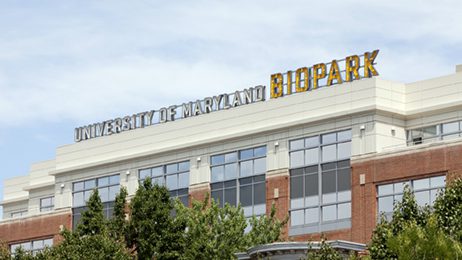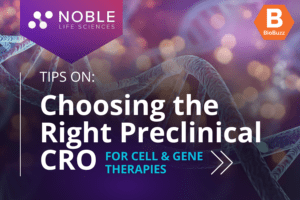
UMB and UMBC to Launch New Baltimore Accelerator with Landmark NIH Grant
November 26, 2023
The University of Maryland, Baltimore (UMB) just announced a bold new program towards fostering greater biomedical entrepreneurship and commercialization through the receipt of a landmark four-year, $4 million Research Evaluation and Commercialization Hubs (REACH) grant from the National Institutes of Health (NIH). This transformative grant, shared with the University of Maryland Baltimore County (UMBC), aims to propel the biomedical ecosystem in West Baltimore and Greater Baltimore while also prioritizing the cultivation of a diverse workforce.
This is one of several announcements out of Baltimore that highlight the region’s aim to become a top hub for life science innovation and industry; including the a federal tech hub designation for the creation of an AI and Biomanufacturing Hub. Additionally, a new $100M early-stage life science fund was just announced earlier this month. The fund, Blackbird Laboratories which is also a partner in the UM-BILD accelerator, is backed by Ravens’ owner Steve Bisciotti and aims to fund and retain new life science startups in Baltimore.
Under the visionary leadership of UMB President Bruce Jarrell, MD, FACS, and UMSOM Dean Mark Gladwin, MD, the university is set to launch the University of Maryland, Baltimore Life Science Discovery (UM-BILD) Accelerator program. This initiative is not only a testament to the commitment of UMB and UMBC to advancing the biomedical field but also a significant step toward building a more inclusive and diverse industry.
The driving force behind UM-BILD is the realization that a comprehensive approach is required to nurture a new cohort of biotech entrepreneurs. Jason Rose, MD, MBA, Associate Dean of Innovation & Physician Science Development at UMSOM and principal investigator of the REACH grant, highlighted the accelerator’s focus on providing essential elements such as research support, funding, guidance through commercialization, and technology development.
“We will be providing mentoring and educational programs from a diverse set of successful life science innovators and leaders,” explained Dr. Rose, emphasizing the broad range of experiences that will be distilled for the benefit of those interacting with the Hub.
Through the REACH grant, 44 early-career faculty and students will receive up to $100,000 each as an initial seed investment to test and develop commercially promising technologies. This infusion of funding will catalyze the creation of UM-BILD’s “proof-of-concept” hub which will be co-located at the University of Maryland BioPark and bwtech@UMBC. Notably, this hub stands as one of only five NIH-funded proof-of-concept hubs in the United States, marking it as a pivotal player in driving innovation.
Dr. Jarrell emphasized that the REACH initiative goes beyond providing immediate support, as it sets the stage for long-term funding opportunities. Successful projects and early-stage companies nurtured by UM-BILD will be well-positioned to attract venture capital funds or federally-funded small business innovation research and technology transfer awards.
Dr. Arti Santhanam, Executive Director of the Maryland Innovation Initiative (MII), a collaborator in the UM-BILD accelerator, announced, “The MII is proud to provide matching funds to accelerate the efforts of the NIH Reach grant and UM-BILD.” She went on to praise the collaborative model, stating, “Our unique model pulls together the five regional research universities to bring a truly diverse portfolio of faculty entrepreneurs and life science innovators, allowing them to move technologies from the lab bench to the bedside more efficiently.”
Furthermore, UM-BILD extends its impact beyond funding, offering access to a dedicated life sciences incubator with core services and equipment at UMSOM and other graduate schools within UMB and UMBC. The Hub also incorporates business training programs, ensuring that inventors, entrepreneurs, and start-up founders receive not only financial support but also crucial mentorship and networking opportunities.
In a strategic move to amplify its reach and impact, UM-BILD collaborates with partner institutions, including the University of Maryland, College Park, and Morgan State University, a Historically Black College/University (HBCU). Additional collaborators include Blackbird Laboratories and TEDCO’s Maryland Innovation Initiative (MII). This collaborative approach aligns with the broader goal of increasing diversity in the biomedical workforce and startup landscape.
The significance of this collaboration was underscored by Karl V. Steiner, PhD, Vice President for Research and Creative Achievement at UMBC, and co-principal investigator on the REACH grant. Dr. Steiner noted that the grant builds upon previous support from NIH, specifically the Faculty Institutional Recruitment for Sustainable Transformation (FIRST) award, highlighting the strengthening partnership between UMBC and UMB.
Valerie Sheares Ashby, PhD, President of UMBC, emphasized the importance of collaborations among higher education institutions in Maryland, citing them as key to the state’s continued economic growth. Dr. Ashby expressed excitement about the potential created by initiatives like UM-BILD, stating that these partnerships align with the commitment to inclusive excellence.
Dean Gladwin, who serves as the Vice President for Medical Affairs at UMB and the John Z. and Akiko K. Bowers Distinguished Professor at UMSOM, addressed the imperative to address diversity in the biomedical field. “Blacks, Latinos, and other underrepresented groups make up 34 percent of the U.S. population, but comprise only 15 percent of PhD graduates and 4 percent of tenured faculty positions in medical schools,” he said. The UM-BILD initiative aims to bridge this gap by providing more opportunities for underrepresented scholars, acknowledging the positive impact of workforce diversity on productivity, financial performance, and employee satisfaction.
David Weber, PhD, Professor of Biochemistry and Molecular Biology at UMSOM, joins the ranks as a co-principal investigator of this grant. Beyond the $4 million from NIH, UM-BILD benefits from over $5 million in non-federal matching funds through partner institutions, including UMB, MII, UMSOM, and UMBC.
As UM-BILD takes its place among the new REACH hubs, including those led by Northwestern University, the University of Montana, Texas A&M Health, and Vanderbilt University, it stands out as a beacon of innovation and inclusivity in the burgeoning landscape of biomedical entrepreneurship and technology development. The launch of UM-BILD not only signals a major step forward for the University of Maryland, Baltimore but also reinforces Maryland’s position as a hub for cutting-edge research and a champion of diversity in the life sciences industry.
- About the Author
- Latest Posts
BioBuzz is a community led, experience focused, biotech and life sciences media and events company. BioBuzz highlights regional breaking news, industry professionals, jobs, events, and resources for business and career growth. Their weekly newsletter is subscribed to by thousands in the BioHealth Capital Region and Greater Philadelphia as the go-to for industry updates.





